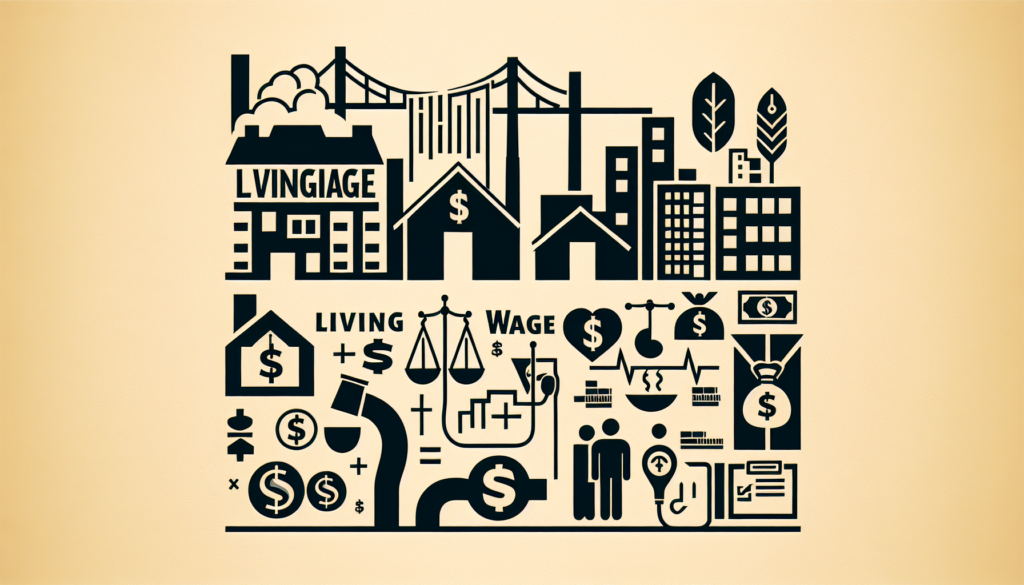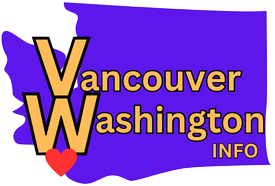
Understanding the Living Wage in Vancouver, Washington
Have you ever wondered what it really means to earn a living wage in Vancouver, Washington? In this article, we will explore the concept of a living wage and break down its significance for workers in this vibrant city. From outlining the basic definition to examining its impact on individuals and families, we will shed light on this important topic and provide you with a deeper understanding of what it takes to make ends meet in Vancouver, Washington.
Table of Contents
ToggleWhat is a living wage in Vancouver, Washington?
Definition of a living wage
A living wage refers to the minimum income required for an individual or a family to meet their basic needs and maintain a decent standard of living. It takes into account various factors such as housing, transportation, healthcare, groceries, childcare, and taxes. Unlike the minimum wage, which is the legal minimum hourly wage set by the government, a living wage aims to provide workers with enough income to afford essential expenses beyond just survival.
Difference between minimum wage and living wage
While the minimum wage is essential in setting a baseline for workers’ compensation, it often falls short of providing a sustainable income that can cover all living expenses. In Vancouver, Washington, the current minimum wage is $13.69 per hour, which amounts to an annual income of approximately $28,427 for a full-time worker. However, this income may not be sufficient to meet the high costs of living in the city.
On the other hand, the living wage takes into account the specific costs of living in a particular area, considering factors such as housing, healthcare, and transportation. It is calculated based on the average cost of these necessities and varies depending on the size of the family.
Calculation of living wage in Vancouver, Washington
The living wage in Vancouver, Washington is calculated using a formula that accounts for different household sizes, spending patterns, and local cost-of-living data. The calculation typically considers the cost of basic needs such as housing, transportation, healthcare, groceries, childcare, and taxes.
For example, a study conducted by the Alliance for a Just Society found that the living wage for a family with two working adults and two children in Vancouver, Washington, is approximately $23.96 per hour. This means that both adults would need to earn at least $23.96 per hour to cover their basic expenses and maintain a decent standard of living.
It is important to note that the living wage can vary depending on individual circumstances, and it is constantly being reassessed to accurately reflect the current economic conditions in Vancouver, Washington.
Factors influencing the living wage
Cost of housing
One of the major factors influencing the living wage in Vancouver, Washington is the cost of housing. The city has experienced a rapid increase in rent and housing prices in recent years, making it challenging for many residents to afford stable and safe housing. As a result, the cost of housing significantly impacts the overall living wage calculations, as it is one of the largest expenses for most households.
Cost of transportation
Transportation is another key factor that contributes to the calculation of the living wage. Vancouver, Washington, has a relatively high cost of transportation, with expenses such as fuel, vehicle maintenance, and public transportation fares. Those who live in areas with limited public transportation options may face additional challenges and expenses in commuting to work or accessing essential services.
Cost of healthcare
Access to affordable healthcare is crucial for maintaining a decent standard of living. The cost of healthcare, including insurance premiums, deductibles, and out-of-pocket expenses, is taken into account when calculating the living wage. In Vancouver, Washington, healthcare costs can vary significantly depending on factors such as age, family size, and preexisting medical conditions.
Cost of groceries
Providing nutritious food for a household also plays a role in determining the living wage. The cost of groceries, including fresh produce, proteins, and other essential items, can vary depending on factors such as dietary restrictions, food preferences, and family size. The living wage calculation considers the average cost of groceries in Vancouver, Washington, to ensure individuals and families can adequately cover this regular expense.
Cost of childcare
Childcare expenses are a significant consideration for families with young children. The cost of quality childcare can be substantial, and it is factored into the living wage calculation. Vancouver, Washington, has seen an increase in childcare expenses in recent years, putting strain on families’ budgets and influencing the overall living wage in the area.
Cost of taxes
Taxes are another factor that affects the living wage calculation. Income taxes, payroll taxes, and other taxes contribute to the overall expenses individuals and families must account for when determining the minimum income required to cover their basic needs.

This image is property of pixabay.com.
Living wage versus poverty threshold
How the living wage compares to the poverty threshold
The living wage is often used as a benchmark to measure how well individuals and families are faring financially in relation to the poverty threshold. The poverty threshold, also known as the federal poverty level, is the income level set by the government to determine eligibility for various assistance programs and to quantify the number of individuals living in poverty.
In Vancouver, Washington, the poverty threshold for a family of four is set at around $26,500 annually. Comparatively, the living wage for a family with two working adults and two children is approximately $49,800 annually. This stark difference between the poverty threshold and the living wage illustrates the challenges faced by many residents who are not technically considered as living in poverty but still struggle to meet all of their basic needs.
Implications of living wage on poverty
Implementing a living wage can have significant implications for poverty reduction. By ensuring that workers earn enough to cover their basic needs, a living wage can help lift individuals and families out of poverty or prevent them from falling into poverty in the first place. It provides an opportunity for individuals to earn a fair wage for their work and reduces their reliance on social assistance programs.
Moreover, a living wage can have positive ripple effects on the community as a whole. When workers have sufficient income to cover their basic needs, they are less likely to face financial stress, which can contribute to improved mental and physical well-being. Additionally, reducing poverty and increasing income equality can stimulate local economies through increased consumer spending and greater investment in local businesses.
Benefits of a living wage
Reduced income inequality
One of the key benefits of implementing a living wage is the reduction of income inequality. In many cities, including Vancouver, Washington, income inequality has been on the rise, with a significant wealth gap between the highest and lowest earners. By ensuring that workers are adequately compensated for their work, a living wage helps narrow this gap and promotes a more equitable distribution of wealth.
Improved quality of life
A living wage directly contributes to an improved quality of life for individuals and families. When basic needs are met, individuals can focus on other aspects of their lives, such as education, healthcare, and personal development. Adequate income can alleviate financial stress, improve mental well-being, and provide opportunities for personal growth and fulfillment.
Increased productivity
Research has shown that paying workers a living wage can lead to increased productivity. When employees earn enough to meet their basic needs, they are likely to be more motivated and engaged in their work. They may also experience reduced absenteeism and turnover rates, which can be costly for employers. By investing in their workforce through a living wage, employers can foster a more loyal and dedicated workforce, enhancing overall productivity and performance.

This image is property of pixabay.com.
Challenges of implementing a living wage
Resistance from employers
One of the main challenges of implementing a living wage is resistance from employers. Some employers may argue that paying a higher wage would increase labor costs and negatively impact their profitability. However, studies have shown that the long-term benefits of a living wage, such as improved employee retention and productivity, can outweigh the initial cost increase.
Potential job loss
Another concern often raised about implementing a living wage is the potential for job loss. Critics argue that increasing labor costs through a higher minimum wage could lead to job cuts or reduced hiring. However, research on the impact of living wage policies has shown mixed results, with some studies suggesting minimal job loss and others indicating potential negative effects, particularly on low-wage industries.
Impact on small businesses
Implementing a living wage may also pose challenges for small businesses, which may have tighter profit margins compared to larger corporations. While larger businesses may have more resources to absorb the impact of increased labor costs, small businesses may struggle to adjust their budgets accordingly. Policy measures and support programs aimed at assisting small businesses in transitioning to a living wage framework can help mitigate potential negative effects.
Living wage policies in Vancouver, Washington
Existing living wage initiatives
Vancouver, Washington, has seen various living wage initiatives emerge in recent years. Some local organizations and businesses have voluntarily adopted a living wage policy, ensuring that their employees earn enough to cover their basic needs. Additionally, there have been discussions at the municipal level regarding the implementation of a living wage ordinance that would establish a minimum wage based on the local cost of living.
Successes and challenges of local policies
The successes of living wage policies in Vancouver, Washington, include providing fair compensation to workers and addressing income inequality. By adopting a living wage policy, local businesses and organizations contribute to creating a more equitable community where workers can thrive.
However, challenges still exist in implementing and sustaining these policies. Some businesses may hesitate to adopt a living wage voluntarily due to concerns about competitiveness or financial strain. Additionally, there may be challenges in coordinating and enforcing these policies across different industries and sectors.

Public opinion and support for the living wage
Perceptions of the living wage
The public’s perception of the living wage in Vancouver, Washington, varies depending on individual beliefs and values. Supporters argue that a living wage is a fundamental right and that no one should be forced to work multiple jobs or rely on public assistance to meet their basic needs. They view the living wage as a means to create a fair and just society where work is adequately rewarded.
On the other hand, opponents may express concerns about the potential negative economic impact of implementing a living wage. They argue that it could lead to job losses, reduced business competitiveness, and increased costs for consumers. However, analysis of jurisdictions that have implemented living wage policies has often found limited negative effects on employment and economic growth.
Support from community organizations
Various community organizations in Vancouver, Washington, have been instrumental in advocating for a living wage and raising awareness about its importance. These organizations often work alongside workers’ rights groups, faith-based organizations, and social justice advocates to promote policies that ensure fair compensation for workers. Their efforts include organizing campaigns, conducting research, and engaging with local policymakers to build support for the living wage.
Public response to living wage campaigns
Living wage campaigns in Vancouver, Washington, have received mixed responses from the public. Some individuals and groups wholeheartedly support the cause and actively participate in advocacy efforts, such as signing petitions or attending rallies. They recognize the need for a living wage to address income inequality and improve the well-being of workers and their families.
However, there are also individuals who doubt the effectiveness or feasibility of a living wage. They may question its potential impact on the economy, businesses, and overall job market. Engaging with these concerns and providing factual information about the benefits and potential challenges of a living wage can be key in building widespread support for such policies.
Case studies of individuals impacted by the living wage
Stories of individuals who have benefited from a living wage
Real-life stories can shed light on the positive impact of a living wage on individuals’ lives. For example, Sarah, a single mother working full-time in Vancouver, Washington, struggled to afford housing, childcare, and basic necessities on the minimum wage. When her employer started paying a living wage, Sarah’s income significantly increased, allowing her to secure stable housing, provide for her child’s needs, and participate more actively in her community.
Similarly, John, a young adult attending college while working part-time, struggled to cover his education expenses and living costs on a low wage. However, when his employer adopted a living wage policy, John’s financial situation improved, and he was able to focus more on his studies without worrying about meeting his basic needs.
Perspectives of individuals who still struggle despite earning a living wage
While a living wage can make a significant difference for many individuals and families, there are cases where individuals may still face financial challenges despite earning above the living wage. Factors such as unexpected medical expenses, debt, or limited employment opportunities in certain industries can impact an individual’s financial stability.
For instance, Michelle, a caregiver in Vancouver, Washington, earns a living wage but struggles to afford the high costs of healthcare for her elderly parents. Despite earning enough income to cover her basic needs, the burden of medical expenses prevents her from achieving long-term financial security.
These case studies highlight the need for comprehensive support systems and social safety nets to address additional financial burdens that extend beyond the scope of the living wage.

The future of the living wage in Vancouver, Washington
Potential for expansion of living wage policies
The future of the living wage in Vancouver, Washington, holds significant potential for expansion. As awareness grows about the importance of fair compensation, there is an increasing momentum for adopting living wage policies at various levels, including local government and private businesses. By working collaboratively and engaging in dialogue about the specific economic factors and social implications of a living wage, stakeholders can further drive the implementation of such policies in the future.
Long-term impacts on the economy
Implementing a living wage can have long-term impacts on the local economy in Vancouver, Washington. By providing workers with better compensation, it can contribute to reducing income inequality, stimulating consumer demand, and improving the overall well-being of individuals and families. The increased purchasing power of workers can lead to increased economic activity, benefiting local businesses and supporting a thriving economy.
Addressing gaps in current living wage calculations
While living wage calculations aim to accurately reflect the economic conditions of a specific area, they are not without limitations. As the cost of living evolves, it is crucial to continuously reassess and adjust the living wage calculations to ensure they capture changing realities. This includes considering emerging factors such as the impact of automation, advancements in healthcare costs, and the influence of climate change on living expenses. By addressing these gaps, policymakers can create a more comprehensive and responsive living wage framework.
Conclusion
The concept of a living wage in Vancouver, Washington, provides a crucial framework for ensuring fair compensation and addressing income inequality. By accounting for various factors such as housing, transportation, healthcare, groceries, childcare, and taxes, the living wage offers a comprehensive approach to determining the minimum income required for a decent standard of living.
While challenges may exist in implementing a living wage, there are significant benefits to consider, including reduced income inequality, improved quality of life, and increased productivity. Public support for a living wage is critical, as it can help drive policy changes and encourage businesses to adopt fair compensation practices.
As living wage initiatives continue to gain traction, Vancouver, Washington, has the opportunity to lead the way in ensuring that all workers earn a wage that allows them to meet their basic needs and thrive in their communities. Through ongoing collaboration, innovation, and a commitment to fairness, Vancouver, Washington, can shape a future where a living wage is not just an aspiration, but a reality for all.
You May Also Like

Are There Any Golf Courses in Vancouver Washington
23 August 2023
How Can I Explore The Waterfront Renaissance Trail In Vancouver Washington
5 August 2023





